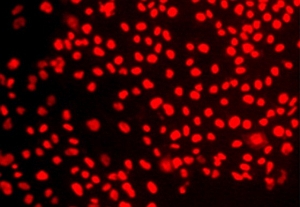
Differentiation of human induced pluripotent stem cells to functional liver hepatocyte cells (Ludovic Vallier, Cambridge University)
A spin-off company from Cambridge University in the U.K. is commercializing a technology to convert adult stem cells into human liver cells suitable for drug testing. The technology, say its developers from Cambridge’s Anne McLaren Laboratory for Regenerative Medicine, can also test for a number of inherited liver diseases and has the potential to accelerate development of new therapies for these conditions.
DefiniGEN is a Cambridge-based start-up company based on the stem cell research of Ludovic Vallier, Tamir Rashid, and Roger Pedersen at the McLaren Lab. Their work involves creating human induced pluripotent stem cells reprogramed from the skin of patients that can be differentiated into almost any cell type. In this case, the stem cells generate human liver cells called hepatocytes with a robust process that makes the cells suitable for commercial use.
The commercial target for DefiniGEN is testing for drug toxicity. The liver is important for the metabolism of drugs and removing toxins from the body, and as a result can be affected by toxic compounds. Drug candidate that can demonstrate they are free from liver toxicity can clear a key hurdle in the drug development process. Vallier says, “identifying toxic drugs as early as possible is vital to the safety and efficiency of the drug discovery process,” adding that if a drug’s toxicity is discovered later on during human clinical trials, “a great deal of time and money will have been lost.”
Current sources for liver cells are primary human hepatocytes, which are difficult to extract and have a high degree of variation, and immortalized cell lines that divide and grow continuously. The researchers report, however, that immortalized cell lines produce an inferior target for testing. The liver cells made by DefiniGEN’s stem cell technology, says the company, have the properties of primary liver cells, but are more reproducible and can be made in large quantities.
That same technology platform, called OptiDIFF, can be used to develop cells as models for the genetic diseases familial hypercholesterolemia and alpha 1 anti-trypsin disorder, according to DefiniGEN. Familial hypercholesterolemia is a disorder that makes the body unable to remove low density lipoprotein or LDL cholesterol from the blood. Alpha-1 antitrypsin or AAT deficiency occurs when AAT proteins made in the liver are made in the wrong shape and get stuck in the liver rather than travel through the bloodstream. This deficiency increases the risk of lung disease, such as emphysema, as well as cirrhosis, or scarring of the liver.
“Cambridge has more expertise in the area of stem cells than perhaps anywhere else on earth,” says DefiniGEN’s CEO Marcus Yeo, “and now we are starting to see promising commercial opportunities which build on that expertise.”
Read more:
- Reprogrammed Stem Cells Help Test for Inherited Diseases
- Clinical Trial Under Way Testing Stem Cell Heart Treatment
- New Process Speeds Multiple Sclerosis Treatment to Trial
- Physical Properties of Productive Stem Cells Identified
- Lab-Made Heart Cells Found Useful for Research, Testing
* * *

 RSS - Posts
RSS - Posts
[…] Cambridge Univ. Spin-Off Creates Drug Testing Stem Cells … From sciencebusiness.technewslit.com – Today, 2:35 PM […]
[…] Cambridge Univ. Spin-Off Creates Drug Testing Stem Cells … From sciencebusiness.technewslit.com – Today, 2:35 PM […]